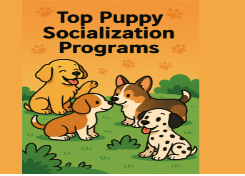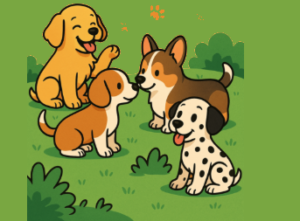The Ultimate Guide to Puppy Socialization Classes
What Is Puppy Socialization?
Puppy socialization is the process of introducing your pup to new experiences in a safe, controlled, and positive way. This includes people, animals, sounds, surfaces, and environments. The most crucial window for socialization is between 3 and 14 weeks of age, a period often referred to as the puppy’s “imprint stage.”
“The early weeks of a puppy’s life are important for building their character and shaping how they cope with the world.” – Dr. Ian Dunbar, Founder of the Association of Professional Dog Trainers (APDT)
Why Structured Puppy Classes Work Better
While it’s possible to socialize a puppy at home, puppy socialization classes provide structured exposure in a controlled setting. These classes are typically led by certified trainers who understand canine behavior and development.
Benefits of structured classes include:
- Supervised play and interaction with other puppies
- Exposure to new people and stimuli in a safe space
- Early correction of unwanted behaviors like nipping or fear barking
- Support for shy or anxious puppies through professional guidance
What to Look for in a Puppy Socialization Class
When choosing a program, keep the following criteria in mind:
- Trainer Credentials: Look for certifications like CPDT-KA or APDT membership.
- Class Size: Smaller groups ensure more personalized attention.
- Curriculum: Classes should include both socialization and basic training.
- Environment: Clean, safe, and enriched with varied stimuli.
- Reviews: Check online testimonials or ask your vet for recommendations.

puppy socialization programs
Top Puppy Socialization Programs (Real Examples)
1. Baxter & Bella Online Puppy School
Baxter & Bella offers a comprehensive online puppy training program with videos, live coaching, and checklists. It’s ideal for busy pet owners or those in remote areas. Their program includes lifetime access for a one-time fee.
Pros: Highly flexible, affordable, great for DIYers
Cons: No in-person interaction for puppies who need real-world exposure
2. Petco’s Puppy Level 1 Training
Available at most Petco locations nationwide, these in-person classes are great for socializing your puppy in a real-world environment. Trainers are certified and sessions cover basic commands, social play, and problem behaviors.
Pros: In-person exposure, affordable group classes
Cons: Availability and quality may vary by location
3. Zoom Room Puppy Training
Zoom Room specializes in positive reinforcement training in small group formats. Their puppy preschool includes social play, desensitization, and confidence-building activities like walking over different surfaces and exposure to sounds.
Pros: Modern facilities, consistent training methods
Cons: Premium pricing in some cities
Online vs. In-Person Puppy Classes
Online puppy classes like Baxter & Bella offer convenience, while in-person classes provide hands-on social experiences. Your choice depends on your lifestyle and your puppy’s temperament. For example, shy or reactive puppies may need face-to-face interactions with a skilled trainer present.
DIY Puppy Socialization Strategies
If you prefer a hands-on approach at home, here are a few tried-and-true methods to help your puppy adjust to the world:
- Use a puppy socialization checklist (download one from reputable sources like the AKC)
- Introduce your puppy to different sounds (doorbells, traffic, hairdryers)
- Visit pet-friendly stores or outdoor cafes
- Host a puppy playdate with a friend’s well-socialized dog
- Attend community events, fairs, or family outings
Case Study: Socializing a Shy Puppy
Emily adopted Luna, a shy rescue pup. She started slowly—first by sitting near a dog park with Luna on a leash. Then she introduced Luna to one calm, older dog. With positive reinforcement (treats and praise), Luna gradually became more confident. Today, she’s a regular at group dog hikes!
Common Puppy Socialization Challenges
- Fearful reactions: Use gradual exposure and never force interaction.
- Excessive barking or biting: Redirect with toys and reward calm behavior.
- Lack of progress: Consult a certified dog trainer for one-on-one help.
FAQs About Puppy Socialization
Q: When should I start socializing my puppy?
A: Ideally between 3–14 weeks. The earlier, the better — with safe, positive experiences.
Q: How long do puppy classes last?
A: Most run for 4–6 weeks with weekly sessions lasting 45–60 minutes.
Q: What should I bring to class?
A: Treats, vaccination records, leash (no retractables), and a curious attitude!
Conclusion: Invest in Your Puppy’s Future
A well-socialized puppy is a joy to be around — calm at the vet, confident on walks, and friendly with new people. Whether you choose a professional training class or use DIY methods, the key is consistency, patience, and positivity. The time you invest now will reward you with a lifelong bond and a well-behaved companion.
Need a starting point? Download a free puppy socialization checklist from AKC.org and begin your puppy’s journey today!
“`










